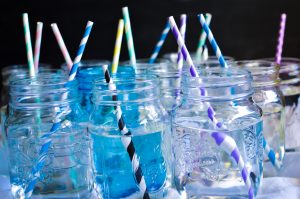It’s Summer and it’s the time for long hot days with plenty of activity. These two factors lead to increased perspiration and greater opportunities for the body to become dehydrated. Water is critical for maintaining every system in your body, including your heart, brain, and muscles. Fluids carry nutrients to your cells, flush bacteria from your bladder, and prevent constipation. Every cell, tissue, and organ in your body needs water to work properly. Your body uses water to maintain its temperature, maintain cardiovascular health, remove waste, and lubricate your joints. Water is needed for your overall good health.
The general rule is to drink 6-8 8 once glasses of water a day. Some people may need less and some more depending on their individual situation and activity level. If you are concerned if you are not drinking enough water, check your urine. If your urine is usually colorless or light yellow, you are well hydrated. If your urine is a dark yellow or amber color, you may be dehydrated so try to add a few more glasses of water to your daily routine.
When rehydrating your body, water is the best choice for a fluid. Juices, sports drinks, coffee and tea do count towards your overall water intake but can also add additional calories, sugar, sodium or caffeine. Don’t forget that water is also found in the food that you eat and some fruits and vegetables have high water contents (eg. watermelon, lettuce, etc)
You may be at a greater risk for dehydration if you have kidney stones, a bladder infection, are pregnant or breastfeeding, have a fever, vomiting or diarrhea or exercise for long periods in hot weather. if any of these conditions apply to you ensure you are vigilant on meeting your daily water quota.
If you find yourself having trouble meeting your desired water intake here are some tips:
-drink a glass of water on the hour
-carry a bottle of water with you so you can have it easily accessible
-drink water in the morning, at every meal and before you go to bed
Older adults often don’t get enough fluids and risk becoming dehydrated because as we age the thirst mechanism is weaker. There are also medications that older adults may be taking that have a diuretic effect. As a result it’s even more important for older adults to follow a fluid intake schedule.

